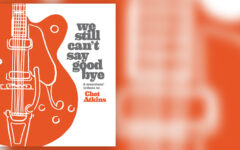
Sometimes you can look at the name of an artist or a producer and be pretty sure what’s coming. Song after song in the same style, often at similar tempos and mostly in one or two keys. Needless to say, working through such projects and trying to come up with something constructive to say in a review can be a slog.
Now imagine the polar opposite of those things and you’ll have Tray Wellington’s Mountain Home Music Co. debut, Black Banjo. Wellington and producer Jon Weisberger will keep you on your toes throughout this 11-song set, mixing up genres, tempos, and playing styles in a seemingly random order. Some listeners might find that jarring – it’s certainly not what we’re accustomed to being served in bluegrass. But I found it refreshing and surprising, like a tasting menu that offers a broad selection of creations from a fun kitchen.
Wellington, a recent IBMA Momentum Award instrumentalist, samples bluegrass, old time, blues, and jazz here, obviously using his banjo as the centerpiece. But in a stroke of brilliance, he and Weisberger also enlisted Avery Merritt, Lyndsay Pruett, and Carley Arrowood to bring a breathtaking range of single fiddle styles to the music. Jon Stickley (guitar), Wayne Benson (mandolin), and Kevin Kehrberg (bass) make up the solid rhythm section. The end result is 44 minutes of eclectic, mostly instrumental music that keeps you guessing and engaged.
The best songs here are the grass-tinged Crooked Mind, Georgia Turnaround and Pond Mountain Breakaway, and the bluesy Port of Manzanita, all instrumentals composed by Wellington. They hint at the magic that might be in store if and when he decides to anchor an entire project in the bluegrass realm.
But Wellington brings an inventive and imaginative approach to a handful of jazz numbers, too, especially John Coltrane’s Namia. His banjo and Merritt’s fiddle play off each other expertly. My only complaint here is that at nearly six minutes, listeners who don’t stream the song or buy the CD aren’t likely to get a chance to hear the magic. (Ditto Wellington’s Unknown Days Waltz, which clocks in at nearly seven minutes).
Wellington, of course, is not the first black banjo player in bluegrass, or the first bluegrasser to dip a toe into jazz. As he acknowledges in the liner notes, “A big thank you to the black artists in roots music and beyond that have laid the groundwork so people like me can know that the possibilities are endless; I can achieve my dreams in any music I perceive and push my boundaries to where I want to be.”
After settling in with Black Banjo, I, for one, am excited to see where those possibilities lead Wellington, and how far he pushes his boundaries. This is a splendid start.







